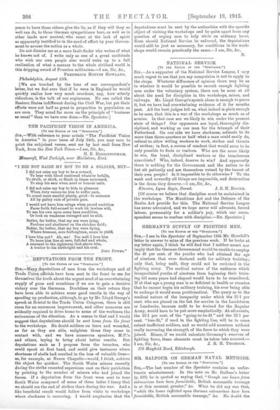.IpEPUTATIONS FROM THE FRONT.
[To 7118 ED/TOR OF 7/1/ ""SPECTATOR."] Siu,—Many,deputations of men from the workshops and of Trade Union pffieials have been sent to the front to see for themselves the truth about the urgent need of an overwhelming supply of guns and munitions if we are to gain a decisive victory over the Germans. Doubtless on their return they have been able to achieve some good results in the way of speeding up production, although, to go by Mr. Lloyd George's speech at Bristol to the Trade Union Congress, there is still room for an enormous improvement, and other measures are evidently required to drive home to some of the workmen the seriousness of the situation. As a means to that end I would suggest that deputations should be sent home from the front to the workshops. No doubt soldiers on leave and wounded, as far as they are able, enlighten those they come in contact with, and we have numerous speakers, M.P.'s and others, trying to bring about better results. But deputations such as I propose from the trenches, who could speak at first hand, and' could give instances where shortness of shells had resulted in the loss of valuable lives— as, for example, at Neuve Chapelle--would, I think, achieve the object far quicker. The South Wales miners recently during the strike resented aspersions cast on their patriotism by pointing to the number of miners who had joined the forces. . If a deputation from the front were sent to tour South Wales composed of some of these latter I fancy that we should see the end of strikes there during the war. And a like beneficial result would follow from 'visits to workshops where slackness is occurring. I would • emphasize that the deputations must be sent by the authorities with the specific object of visiting the workshops and be quite apart from any question of urging men to help while on ordinary leave, Even should National Service be enforced, the deputations. would still be just as necessary, for conditions in the work- shops would remain practically the same.—I am, Sir, &c.,
B.


































 Previous page
Previous page